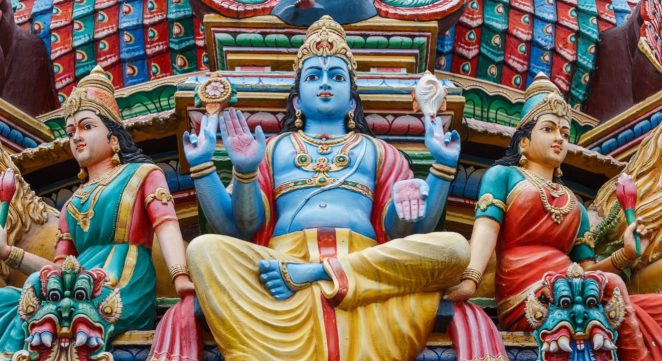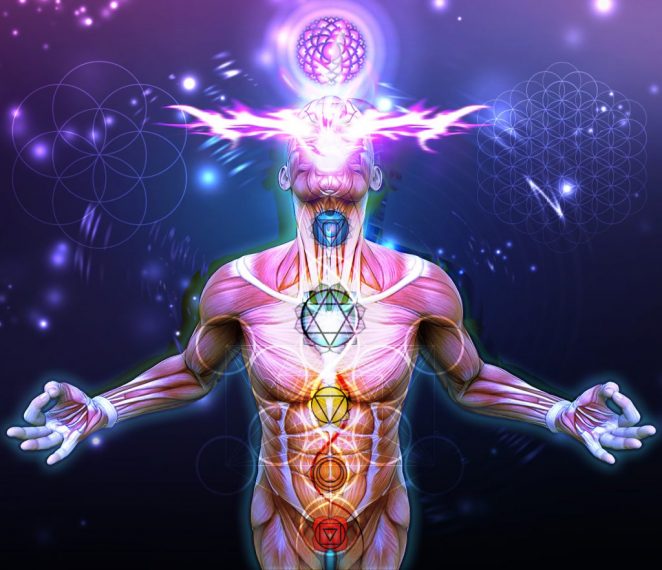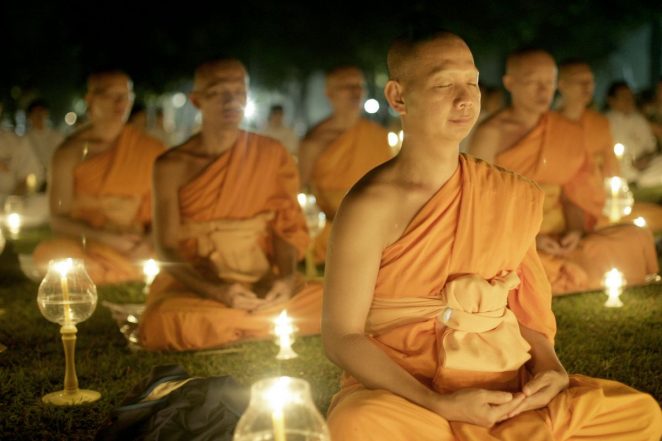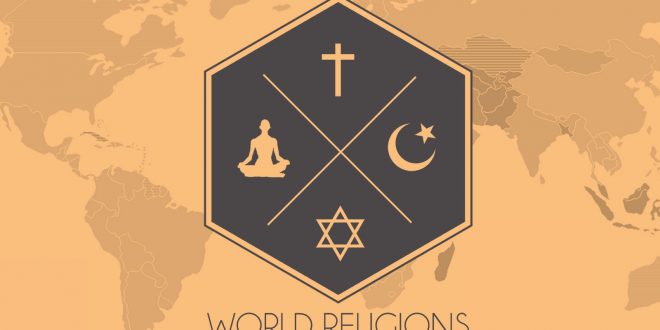Major world religions all have a similar goal to reach, the wish to make it through life with success, and in accordance with everything that is good. However, the differences in various other aspects. This article looks into the five major world religions and examines their differences. These religions are Hinduism, New Age Spirituality, Buddhism, Islam, and Christianity. Each religion has its own set of beliefs and values, and the article will mainly focus on the core parts.
Major World Religions:
Hinduism
The believers of this religion worship one ultimate Being, called Brahman, through an infinite number of representations of various gods and goddesses. The incarnations of these many deities are idols, temples, gurus, rivers, animals, etc.

Hindus believe that their position in this world and present life is determined by their previous actions, those from a life that came before. Hinduism may provide an explanation for suffering and evil in this life, as the result of your prior actions in the last. If one was evil before, they could experience immense hardships in this life. Those people may come across different pain, disease, poverty or natural disasters because they deserved it by their own evil deeds during a previous lifetime.
The goal of each Hindu is to become free from karma and this continuous reincarnation cycle. The only thing that matters is the soul, which will one day finally be free of the rebirths and enjoy rest.
Hinduism is also a religion that lets people choose how they work towards their spiritual perfection. They can go with either of the following three ways to break the karma. Firstly, they can be lovingly devoted to a Hindu deity. Secondly, one can grow in knowledge through meditation of Brahman, until they realize that circumstances are not real and that only Brahman is real. Finally, they can be dedicated to different religious ceremonies, rites and tradition.
New Age Spirituality

This religion promotes the development of the power or divinity in the actual believer. The teaching does not deal with an almighty godly being who created the universe. It actually refers to a higher consciousness within each believer. Therefore, a person who is pursuing spiritual development is themselves the deity, the cosmos, and the universe. Everything the person sees, hears, feels and imagines is of divine nature.
This is, therefore, a highly eclectic religion, and a collection of ancient spiritual traditions. A wide range of speakers, books, and seminars teach the religion, and it acknowledges many different gods and goddesses, similar to Hinduism. The Earth is looked at as the source of all spirituality, with its own intelligence, emotions, as a whole deity. However, superseding all is one’s self. It is the originator, controller and the one power over everything. Outside of what a person determines, there is no reality.
New Age Spirituality also teaches some of the eastern mysticism and spiritual techniques and practices of the metaphysical and psychic kind, like breathing exercises, drumming, chanting, and meditating. The goal of these is to develop an altered consciousness and your own divinity.
Negative things that a person experiences like failures, anger, sadness, selfishness and being hurt, are considered as an illusion. The followers believe they are completely in charge of their life, and that nothing about it is wrong, negative or painful. They eventually develop spiritually without objective and external reality. The person becomes a god himself or herself and creates their own reality.
Buddhism

Buddhists do not worship gods, nor do they worship the Buddha, which is a common belief in the world. The Buddha (Siddhartha Gautama) never said he was divine and is viewed by the followers of Buddhism as an example of what each one of them strives to become, which is spiritual enlightenment and freedom from the continuous life and death cycle.
Most of the Buddhists believe that a person has countless rebirths, which they see as suffering they want to escape. They think that it is the craving of people, their aversion and delusion that cause endless rebirths. Therefore, the goal of a Buddhist is to purify one’s heart and to let go of all yearnings toward sensual desires and the attachment to oneself.
There is a list of religious principles in Buddhism, where the followers adhere to personal restraint. They practice fasting meditation, which is a matter of self-discipline to them. Through a devoted meditation, they aim to reach the state of Nirvana, “the blowing out” of the flame of every desire. The religion essentially provides disciplines, values, and directives that many of its followers want to live by.
Islam

Muslims believe in the one almighty God, Allah, an infinitely superior and transcendent being than any human. Allah is the creator of the whole universe and is the source of both good and evil. Everything that happens in the world is the will of Allah. He is also a powerful and a strict judge, merciful towards his devoted followers. The basis of his mercy is the good works and religious devotion of his subjects. The relationship between Allah and the followers is similar to a master-servant relationship.
Muslims also honor several prophets, of which Muhammad is the last prophet whose words and lifestyle are the authority of the followers. Every Muslim must follow five religious duties. They should repeat a creed about Allah and Muhammad, recite prayers in Arabic five times a day, give to the needy, fast from food, drink, smoking and sex one month each year from sunrise to sunset, and take a pilgrimage once in a lifetime to worship a shrine in Mecca. After passing, if a Muslim does all of this throughout their life, they will be allowed to enter Paradise. If not, they are punished to Hell for eternity.
For many, Islam presents their true expectations from religion and its respective deity. It teaches about a sole supreme deity, worshiped by completing good deeds and following religious rituals. After a person’s death, he or she is rewarded or punished accordingly. Famously, Muslims also believe that by giving up your life for Allah, you surely earn your place in Paradise.
Christianity

Christians believe in one eternal and almighty God, the creator of everything in existence. He is depicted as a loving God, offering each person a personal relationship with himself in this life.
During his life on Earth, Jesus Christ did think of himself as being a prophet who points to God, nor as a teacher of enlightenment. Instead, he presented himself as God in human form who performs miracles and forgives people of their sins. He also said that anyone who believed in him will, in turn, have eternal life.
His followers regard the Bible as the written message of God to the humankind. Except being the sole historical record of Jesus’ life and deeds, the Bible also reveals his personality, love, and truth, as well as how one can know God and relate to him, similar to a friend.
Importantly, Christians believe that all people make sins, including themselves of course. Jesus is their Savior, the Messiah who was prophesied by every prophet from the Old Testament. Out of love, Jesus Christ, paid for all of the sins of humanity when he died on the cross. He rose from the dead three days after, as he had promised, a deed that proved his deity for an eternity.
How distinct are these major religions?
When we look at the five major world religions, their belief systems and the views of God, there is some rather tremendous diversity:
Hindus acknowledge many forms of gods and goddesses, Buddhists say that there is no deity, while New Age Spirituality says that the believers are the God. Muslims believe in a powerful God who is unknowable, while Christians believe in a God who is loving, and who wants us to know him.
The question arises, do all of these religions worship one and the same God? New Age Spirituality believes that everyone is the center of cosmic consciousness, which requires Islam to give up their one God, Hinduism to give up their many forms of one god, and Buddhism to establish that there actually is a being like a God. Finally, only one religion teaches of a loving God, supposed to be known in this life.
What does each religion require?
The five major world religions are also different in what they require from the followers. Most proclaim for the individual to strive for spiritual perfection. Hindus wish a release from Karma, New Age believers are their own deities, Buddhists wish to be free from desire, while Muslims follow five strict laws to enter Paradise. With Jesus and the Christian God, there is a relationship with him in this Earthly life, based on what Jesus did for Christians.
All religions are working on the same problem
Everyone is aware of personal failings, as well as the need to always be better. This is why religions are created. In addition, people want to be at peace, fulfilled, and to have inner strength. Therefore, practices like meditation, rituals, books, fasting, prayers, sacrifices, and pilgrimages exist.
When the actual connecting with God is concerned, the being who created us and everything around us, the lack of personal effort is not the problem. The problems are our sins, as no amount of good deeds makes or covers up something contrary to the holy ways of religion.
 Vermont Republic Second Vermont Republic
Vermont Republic Second Vermont Republic




